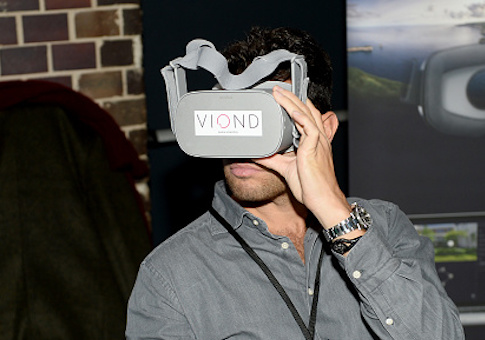The National Institutes of Health is spending over $1.7 million on a virtual reality game for young men who have sex with men.
"Tough Talks" is a virtual simulation that allows young gay men to practice how to tell their partner they have HIV, using virtual reality technology. A technology training company—Georgia-based Virtually Better, Inc.—as well as the University of North Carolina at Chapel Hill and the University of Southern California Institute for Creative Technologies are creating the game.
Sixty-seven percent of young gay men do not disclose their HIV status to first-time sex partners, according to the grant behind the study. Researchers see virtual reality as a solution.
"Given the potential benefits and challenges associated with disclosure, there is a need for sophisticated interventions that can assist [men who have sex with men] MSM, with the disclosure process," the grant states. "Virtual reality provides a unique environment for users to practice HIV disclosure."
"Primary outcomes of HIV viral load and condomless anal intercourse (CAI) will be assessed at intervention completion (1 month) and at 6-month follow-up," according to the grant.
The project began during the Obama administration in 2014 and has cost taxpayers $1,788,748 so far. The project will continue through May 2020.
In July 2018, researchers published results of the study, which recruited young men to participate over Craigslist, Facebook, and Grindr.
The paper, entitled, "'I Didn't Tell You Sooner Because I Didn't Know How to Handle It Myself': Developing a Virtual Reality Program to Support HIV-Status Disclosure Decisions," found most young gay men found the game "visually appealing" and said it could help them in their conversations.
Researchers first conducted focus groups to base their virtual conversations about HIV, which were used to develop three virtual characters.
"In Phase 1 (focus groups) eligible participants were ages 18–30, assigned male sex at birth and identified as male, reported engaging in anal sex with a male partner within the past 12 months, and English-speaking," according to the paper.
The virtual characters were given conversational skills that are "culturally sensitive to a variety of racial and ethnic backgrounds and sexual identities."
The characters are able to display a wide range of emotions, including "anger, fear, rejection, blame, ignorance, curiosity, confusion, support, concern, sympathy, empathy, acceptance, [and] love."
The virtual reality game lets young gay men practice several scenarios of disclosing they have HIV "post-condomless anal intercourse" with casual or primary partners. The virtual characters either have a neutral, sympathetic, or negative reaction.
